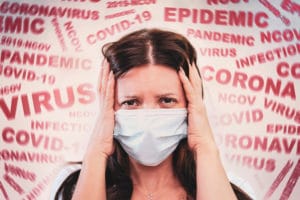 In early 2020 the world was exposed to a pandemic that created chaos, confusion, and anxiety when COVID-19 became part of everyone’s life. The unknown is always scary, but it seemed especially scary, yet oddly less isolating, knowing that everyone on the planet was experiencing the same event at the same time. People who had never really experienced anxiety symptoms such as racing heartbeat, increased nervousness, a sense of panic or danger, trouble sleeping, and hyperventilation began to experience such sensations. The idea that people were becoming very ill leading to hospitalization, and in some cases, even death, increased our distress, especially as the situation felt so uncontrollable.
In early 2020 the world was exposed to a pandemic that created chaos, confusion, and anxiety when COVID-19 became part of everyone’s life. The unknown is always scary, but it seemed especially scary, yet oddly less isolating, knowing that everyone on the planet was experiencing the same event at the same time. People who had never really experienced anxiety symptoms such as racing heartbeat, increased nervousness, a sense of panic or danger, trouble sleeping, and hyperventilation began to experience such sensations. The idea that people were becoming very ill leading to hospitalization, and in some cases, even death, increased our distress, especially as the situation felt so uncontrollable.
Effects of Quarantine
Quarantine created another dimension of anxiety as people were asked to isolate themselves to prevent the spread of the virus. Isolation added another level of panic, perhaps unseen and misunderstood by many, but nevertheless present. Unable to socialize in person, we learned that there truly is some kind of unseen energy among people that gives us a sense of connection, one that Zoom parties cannot provide.
Think about it: when you sit among friends and laugh together, you likely feel happy. Holding a person’s hand can feel warm, loving, and comforting without words being spoken. When a person around you gets angry or sad, it’s almost as if you can feel it. Perhaps you feel empathetic or perhaps uncomfortable. The unseen energy we experience each day as we rush to the subway, sit with a friend for lunch, or spend time with a client, generates a reaction within us. So yes, isolation coupled with uncertainty definitely created anxiety and panic in many.
COVID-19 Anxiety Syndrome
As one can imagine, COVID-19 is a topic that comes up often in sessions with clients. It is a very real part of our lives and, from the looks of it, something we will need to understand as a permanent presence in our lives whether directly or indirectly. In understanding this, becoming more knowledgeable about the mental health issues COVID-19 has created in millions is important so that clinicians can best assist clients with their mental health needs. We know that many clients experience anxiety, but is the anxiety directly correlated to COVID-19? If so, how drastic are the symptoms being experienced? You may be experiencing COVID-19 Anxiety Syndrome (verywellmind.com) if your symptoms include:
- obsessive thoughts of COVID-19;
- anxiety over daily activities like work, school, errands;
- feeling hopeless about COVID-19;
- social distancing/isolating even when unnecessary;
- inability to get a decent night’s sleep
- constantly checking for symptoms
- over-cleaning
Post-Traumatic Stress Disorder
It’s okay and perhaps even necessary for people to vocalize that they are afraid of what they have experienced, and to be concerned about the unknown. Aside from Covid Anxiety Syndrome people may also have a level of post-traumatic stress (PTSD). The reality we all experienced, on various levels, has left effects that will live with us forever. It isn’t unusual to understand that people are experiencing post-traumatic stress due to COVID-19. Although people often associate PTSD with traumatic events like a car crash, abuse, or something they experienced that was shocking, it is hard for people to understand their COVID-19 experience as possibly causing PTSD. The reality is that COVID-19 has been a shocking and scary event. We know that it’s potentially deadly. You should seek evaluation by a mental health care professional if you’ve suffered trauma due to COVID-19.
“What do I do now?”
Even though vaccines and continually updated protocols have helped the world progress toward recovery, the anxiety and panic are still very much with us. People are asking, “What do I do now?”
The first thing is to understand that you are not alone in what you are feeling and thinking. Once you can take that in, remember to take time for yourself to reflect on how you feel and understand that it is okay to feel that way. Ask yourself, “Am I taking the necessary precautions to keep myself safe?”, like using hand sanitizer when necessary and wearing masks when around other people.
Talking to someone who understands you without judging you, will help as well. If speaking to a friend or family member is not helping, perhaps it is time to see a mental health professional who can guide you through your healing process. An unbiased person, knowledgeable of your needs, usually offers great relief and support in encouraging your empowerment.
Finally, keep in mind the things that may be triggering your symptoms. For example, the news and social media may, at times, feel overwhelming. Do you start to feel some anxiety during these times? Is it when talking to a specific person that you start to feel more anxious? If so, perhaps stepping back from those can help, replacing them with something that offers peace and comfort, like a yoga session or a cup of tea with your favorite book. But the most important message to remember is…you are not alone.
If you’re suffering from COVID-19 Anxiety or PTSD, we can help. Contact us today for a complimentary 15-minute phone consultation.
Peaceful Way Psychology is located in Midtown Manhattan. They believe in diversity, and provide individual counseling, couples counseling, and family therapy.
